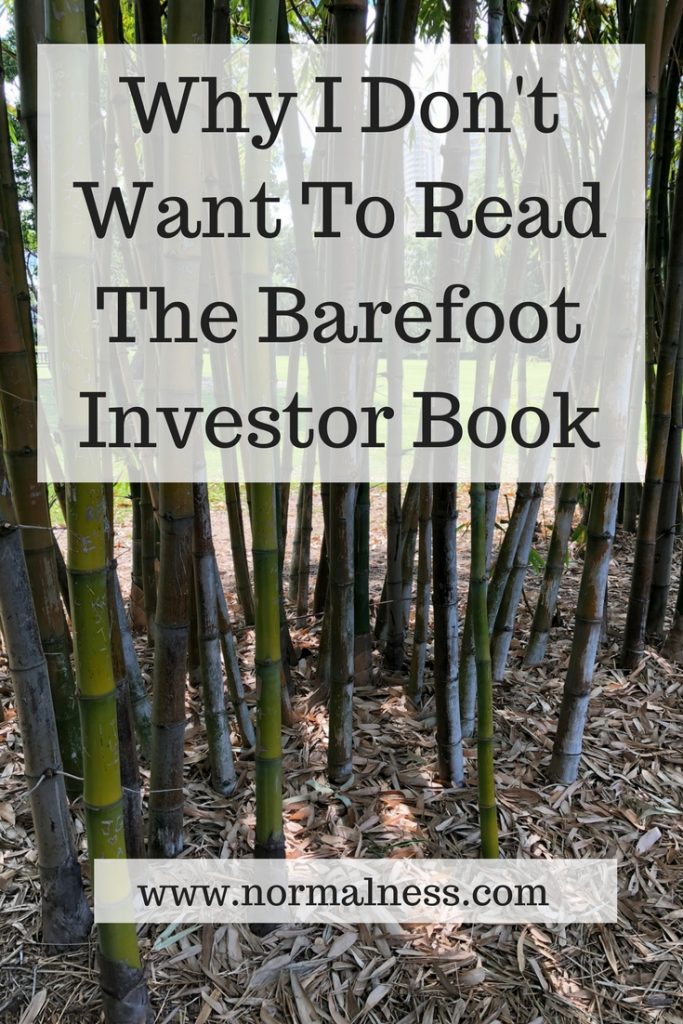Firstly, I don’t think knowledge is actually ever wasted. It doesn’t matter if it’s a decade until something “clicks” or until you use it, it’s not a waste. As you know, I undertook epic finance-stuff in 2017. (And you can read more about money in general in this section of my blog.)
Why I Don’t Want To Read The Barefoot Investor Book

Lots of people recommend this book. Seeing as I don’t buy books (as a writer, that hurts me to admit, but I only borrow books from the library 99.99% of the time), I went to the Barefoot blog first, to see if I’d even want to put a hold on it at the library.
And you know what? I wasn’t impressed. I like how Scott writes. His humour and sarcasm and views of politicians and politics mirror my own. But a few things about the content lead me to the unimpressed position.
(Caveat: I am a blogger – uh in case you didn’t notice. I realise that what is written on a blog and what is published as a paid product can differ in level of detail. This blog post is based on me reading the Barefoot Blog as an introduction to see if I want to read the book. Maybe the book is totally different. But if it is, then I think some work on the content marketing in blogging may be needed. But now I’m really getting off topic.)
Basic Advice
My understanding is that the book is meant for anyone and everyone as an introduction to personal finances. I found the blog posts too basic. Um, yes, I can work out on my own that I need to put money aside for bills and emergencies and so on. I already do that with my budget.
Maybe the “problem” I have with the blog posts is that I’ve done so much reading and learning on my own finances in the past year that I have surpassed this level of financial advice? It could be. I don’t have anything to benchmark myself against, except, I suppose, these blog posts I was reading.
Dual Income Focus
This is actually the part that annoyed me most. Of course if I lived in a dual income household we’d be saving the second salary (firstly for debt pay off, then a home deposit). Unfortunately, most advice I read on the Barefoot Blog was for dual income families.
We already live a frugal life on one salary that is below the Australian median. I don’t have a problem managing my money (though as you’ll have seen from my blog posts, I’m always willing to learn and tweak to make my money work better for me), our problem is not having enough coming in to save for things like a house deposit.
I felt like it was approaching the territory of when people tell very low income earners they’d be fine if they just budgeted better, only the focus isn’t on welfare recipients, but dual income families. Maybe by virtue of being a single income household I fall out of the target market of this book? I did do a search on the blog for “single income” and didn’t find anything much of substance. In fact, one post by someone who said they couldn’t work resulted in advice for them to work. Potentially ableist, depending on the reason for the persons inability to work.
Subscribe to the NormalNess Newsletter here.
I’m Too Poor For His Advice
And then I found a post that did explain my issues. To a degree, and like I blogged about for low income earners, he does say you need money to make the steps work. While I don’t think that’s helpful advice for those on low incomes, I do respect the honesty that he does say this upfront. So maybe I’m not clicking as much as others do as I’m slightly too poor for this?
The general advice on the blog is about following 9 steps. One of those steps is to allocate 60% of your income to basic living expenses, leaving 20% each for saving and splurging. On paper, I have no reason to disagree with this. However, I took a look at what 60% of my income is. And no, I can’t pay all my bills on 60% of my income. I don’t have expensive rent or bills, and I still can’t pay all of my expenses on 60% of my income. Kind of.
I could probably pay whatever is due that pay period on 60% of my income. But that wouldn’t allow for putting money aside for emergencies, insurances, or large bills like electricity and car registration. I believe if I followed the 60/20/20 rule right now, I would end up going backwards.
If you like this blog post, you can support me in a number of ways.
I would like to see financial support for those on less than an average income actually written about. It seems to be an ignored part of the finance world. The too hard basket. Something more substantial than the stupid Joe Hockey style advice of “oh just get a bigger income to save for a house”.
Having said all of this, I’m sure there are tips and tricks and tweaks and general things to learn in the book. I am not an expert or qualified. Of course there’s more I could learn. Basically, for me, for my situation, and based on the blog posts, I don’t understand the high level adoration for basic advice.
Update:
I did end up borrowing an e-version of this book and it pretty much confirmed my assumptions based on the blog. I did learn one or two things about investments that were mildly interesting but not of immediate use to me. Again, if you’ve already got a basic budget or organised your finances in some way, there’s little value to the book itself. You can apply the basic knowledge from the blog without spending money on the book.
Have you read the Barefoot Investor book? What did you think of it?







I had been thinking of reading it but I think I will do the same and checkout his blog first.
I’m sure there is something to learn, but as for it being world-changing, I can’t see that based on the blog posts.
I just can’t read books like that. My eyes glaze over. Unfortunately not an area that grabs my attention … though it probably should!! #TeamLovinLife
You’d hope there’s a voice for every interest level…but also it is finance which is usually written without a skerrick of personality.
Sounds like it is geared up for people on better or dual incomes who could easily implement a few changes to improve their finances. There are some basic inequities in our society around housing affordability, securing employment, and fair pay that make it almost impossible for some people no matter how skilled they are at money management! That’s great you borrow from the library! It’s a cost-saving in itself and also helps the environment.
That’s a good point – I do only buy books I know I’ll re-read or are good reference books.
I haven’t read it, but I know people who have who have said the same as you. I think if his voice doesn’t speak to you, even if his message was more appropriate for you it would still grate at you. There’s not a one size fits all approach for money management – all we can do is take the tidbits that work & discard those that don’t. #TeamLovinLife
Oh that’s interesting, I had pretty much only heard glowing things, which is why I checked out his blog. I don’t mind HOW he writes, I just find the information isn’t relevant to my household.
I haven’t read his book because I am WAY past the stages he talks about and we’ve always been frugal, so we’re debt free. I think he is really aiming for the HUGE number of people who are useless with their money and live on credit and spend more than they earn. I have no idea how they live like that, but for the ones who want to turn it around, I think he has a lot to offer (and I like his column in the Sunday paper – yes I’m so old I actually read newspapers still!)
I think that is where I’m not getting it, single income, already frugal… not much for me to gain there. If we had a second income we’d pay off the little debt faster and then save for a house. All pretty simple to me.
I thought it was well written and savvy, and he grabs your attention. I read the chapters related to retirement and then gave the book to my son who found it helpful and inspiring – mostly inspiring to just get better on track I think.
If it helps some, I’m all for it. It just didn’t seem to add value to me. I imagine given that money isn’t talked about by many that giving it to anyone younger is probably only going to be a good thing for them.
No I’ve not even heard of this book. You have piqued my interest. I’d better take a look. #TeamLovinLife
Have a look at the blog first – I imagine if you’re not a wild spender and have worked out savings are needed in life it won’t add too much to your financial literacy.
I got it for Christmas and enjoyed reading it. Best of all it gave me the kick up the butt I needed to roll all my super funds into one. However other than that I didn’t get much out of it – hubster and I are already pretty well set up with how we handle our finances, though in a slightly different way. Back in the day we literally use to put cash in a number of envelopes for different things and keep them in our safe!!!
Ugh super. I have some that won’t auto-roll and I have to apply to each of them with certified paperwork. Haven’t done that yet as I haven’t been to a JP!
I haven’t read it and I see it come up on Audible as a highly recommended listen/read. I like Scott Pape and I think his ideas are sound. However, as you rightly say they are not for everyone or every stage. In fact we are so far away from his audience it is not funny.
I do hope though that if some of the ideas can be adapted for people’s situations then that is a good thing.
Great post Vanessa!
I quite like HOW he writes and talks about money, I just don’t see added learnings for me from what I already do.
My husband has this book but I haven’t read it. I’ll have to have a flick through it and see if it’s relevant to us or not.
I’m sure there’d be small bits to take away but if you’re sensible with money already, I don’t know if there’d be massive advantages.
Nope. Haven’t read it. Not planning to. #teamlovinlife
I have read it and for us it was very light on given our stage of life. Having said that I thought it was a good basic introduction for anyone who has no idea how to structure or manage their finances. My 20 year old niece was given a copy for Christmas and it was a great conversation starter and confidence builder for her. She won’t follow slavishly but if she finds even 10% of it useful it will be a good thing.
Totally agree, seems like it’s a good intro if it’s something that you’ve never thought about. And any financial literacy is a great step. I just wish I’d seen more relevancy to me.
Don’t judge the book based on his blog. I read the book first and then decided to look at the blog. The blog posts weren’t as useful as the book.
I’m a single mum on what is considered a low income (approx 35k a year). Whilst the 60/20/20 rule may not work, he does encourage you to play with those numbers so they work for you. I think start the book does best is give a framework for setting up your savings habits. He also gives you advice on how to talk to insurance companies, banks etc on getting a better deal.
There are no money saving tips (like telling you to buy in bulk to save money, stop eating out etc). I think a lot of people try this and slip back into old habits, so their savings habit isn’t formed. This method allows you to still slurge to a point, but once that allocation is gone you have to tighten your belt. If you are super frugal already then you can choose to do something else with your splurge money.
The book has given me a bit more of a direction in how I can set my finances up. I recently reviewed my budget and realised that I have a lot more potential to save, so it came along at the right time.
It’s great that you’ve gotten value out of the book Ally!
There are lots of tips in the books relating to buying shares, how to get the most out of investments, money you’re putting away for your children, and how to retire comfortably. It’s not just about getting debt free and being frugal. This blog is just blowing your own trumpet for your own budget by talking about something you haven’t even thoroughly read. ??♀️
That’s true, I haven’t read it, and I don’t want to, for the reasons outlined in this post. I didn’t say it was useless for everyone, I said I don’t see the value in it for myself.
And yes, I am allowed to blog about and be proud of my own individual situation, choice and set up of my finances. It’s the great thing about having your own blog, you can say what you think. It’s quite empowering to talk about your money in the way you choose to as a individual.
Tread your own path?
I would say out of everyone I know, I’m the most money savvy being well set up with investments, budgets, super, spreadsheets etc. I read Bare foot Investor and it took to me to the next level. And I’d just like to add that I’m not a fad, groupie, guru worshipping type in the least!
I honestly thought I was working until I was at least 60 (11 years) to access a basic Super. In one week I’ve re-calculated my spreadsheets, restructured my plan ( and thought processes) and I can retire in 5 years with house paid off and live comfortably.
There is always something in everything for everyone, I believe
Read it regardless of your income. We are a single income family, 2 of our children are self funded uni students, ones in high school and the oldest is married and saving for a house. The book has changed the way we all handle our money and made us more honest with ourselves re our finances. I budgeted, paid bills on time and lived pay to pay, we had done for 30 years. Now we have a goal oriented plan, no credit card debt, and no more lying awake worrying. You don’t have to follow it to the letter, but it is a great framework to build on.
some things that i found useful was giving details of how to check your super rates and what to ask about. Options for buying shares and things to look out for as far as having self managed super funds. I like the guides on spending just because I know I can go a bit overboard occassionally so it gave me a better guide.